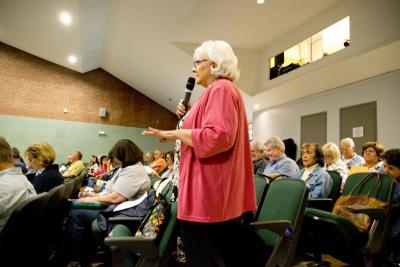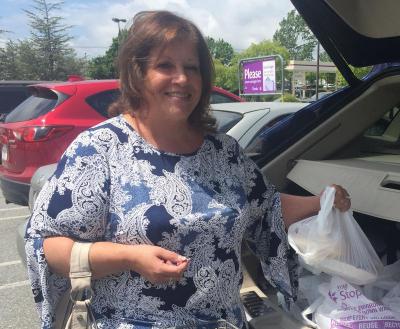Town Meeting members approve plastic bag ban, strike down gas station bylaw change
The familiar "paper or plastic" prompt at checkout counters will be no more after a thin-film plastic bag ban was passed at Town Meeting.
After nearly 20 minutes of debate among residents and officials, the ban on the plastic bags commonly used at supermarkets and retailers was approved at the June 5 Spring Town Meeting.
After a one-year grace period, which begins once the law is approved by the state Attorney General, retail, wholesale, and restaurant locations with at least 5,000 square feet of space will no longer be allowed to use the bags in town.
Exemptions are made for certain items used to wrap or pre-package goods, such as meat, seafood, and newspapers.
“A slight modification in our behaviors will make a huge impact on our community and wildlife,” said Jamie Jacquart during the meeting.
Frank Gracie was one of two Select Board members who had voted against recommending the ban, citing a pending state law on the issue. However, town attorney Anthony Savastano was doubtful residents can count on that because the current bill being debated in the State House is inadequate.
The bylaw was proposed by the Select Board, and was the idea of member Stanley Mickelson. He said he feels the state could use it as a model in the future, and doubted the state's ability to pass the ban.
Not everyone is on board with the approach, however. Brian Houghton, Senior Vice President of Government Affairs and Communications for the Massachusetts Food Association, said a town-by-town approach can cause problems for the companies it represents in the supermarket and grocery industry.
“It just gets extremely difficult, as you can imagine, for a multi-store, multi-state operator to operate in various cities and towns that all have different standards,” Houghton said.
Residents and businesses are already reacting. David Tatelbaum, a Select Board member who also owns Big Value, said his store set up a "Box Buggy" offering boxes to use in place of plastic bags, and is running promotions for free reusable bags.
Moments after the ban was approved, customers at the Dartmouth Stop and Shop were busy loading groceries into their cars.
“I think we should use a lot less plastic,” said Sally Truslow. “It’s why I carry my own bags, reusable bags, and I think we should.”
Lynn Dolebec lives in Westport but routinely shops in Dartmouth. She also has reusable bags, but she said she always forgets them.
Two items were not approved at the meeting. One article which would have modified fines for handicap parking violations was withdrawn to get more input from the disability commission.
It would have created a set of written warnings and a small fine for handicap parking placard holders who simply forget to display the placard, which co-town administrator Greg Barnes said represents a majority of the violations issued in town.
A proposal to remove a zoning bylaw blocking the construction of gas stations within 300 feet of schools and daycares was voted down. The removal was proposed by Carri Corp through a citizens’ petition after it was denied a building permit for a gas station at the corner of Faunce Corner Road and Ventura Drive because of the regulation. Company officials were not present at the meeting.
“I believe that removing this article from current bylaws would place every school, public or private, nursing home, anywhere that handles children or the elderly, it would put them at risk,” said Marjorie Nunes, owner of the Kiddie Kampus daycare located near the proposed gas station.
Officials and residents also worried about the risks posed by gas fumes, batteries, and tanker trucks.
Other items on the agenda drew discussion, including $400,000 to fund an initial phase to renovate Dartmouth Memorial Stadium, long proposed due to its deteriorating condition. The funding will be used for initial design and phase planning, explained School Business Administrator James Kiely.
Once a plan is developed, the department will approach Town Meeting again for more funding to renovate the stadium’s turf field, lighting, and grandstands.
With no discussion, members also passed the Department of Public Works' self-sustaining solid waste fund, which has gone up by 7.35 percent this year.
Residents will see a $10 increase in the town’s recycling service to compensate, from $80 to $90. It’s due to new recycling import standards passed in China, which is driving up recycling costs.
“This is a nationwide problem right now -- how to cost effectively get rid of recyclables in light of the major market for them basically being shut off,” Barnes said.
Town Meeting voters approved all other items, including an $86.5 million budget, a host of capital items, new fines for recently enacted or updated bylaws, and union contracts.















